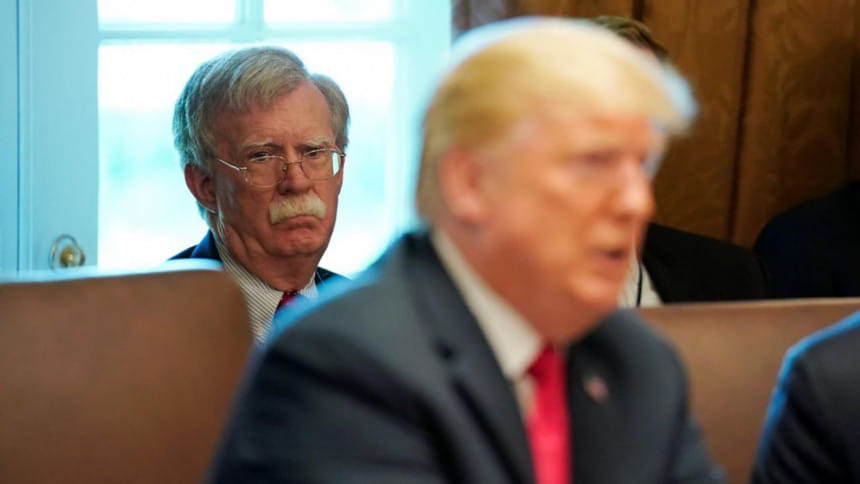US-Iran Standoff: Will good sense prevail?

The words echo an era of the 1950s and early '60s when McCarthyists in America, followers of Republican Senator Joseph McCarthy from Wisconsin, believed that the only good communist is a dead communist. It is this that led the US to bomb communist North Vietnam relentlessly for over a decade and a half. We all know how that episode ended. The communists won that war. Chaotic scenes of American diplomats, residual military personnel and their South Vietnamese collaborators climbing over each other as they frantically tried to board the last military Huey helicopter taking off from the roof of the US embassy in Saigon, as Ho Chi Minh's communist forces from across the 17th Parallel closed in, are etched into everyone's memory. To add to the irony, President Trump travelled to Vietnam's capital Hanoi in an attempt to make peace with another Asian communist adversary from across the 38th Parallel.
The more recent painful experiences in Afghanistan, Iraq and Syria are stark reminders of the material, moral and political costs of war. Importantly, very few wars are justified.
The number of brave American servicemen needing psychiatric counselling for the trauma inflicted while fighting the enemy in Afghanistan and Iraq is far too high. Any misadventure on the Persian Gulf will only add to that number.
One would not offer a certificate of good governance to the current theological regime in Tehran. But it did demonstrate a sense of responsibility by agreeing on a deal with key global players, including the United States, to not develop nuclear weapons. European co-signatories to the treaty believe that Iran has stuck to its commitment so far and are urging restraint and calling for diplomacy to be given a chance.
For the Trump administration, therefore, to arbitrarily pull out of the agreement, impose punitive sanctions and deploy an aircraft carrier and bomber planes to the Persian Gulf, a highly volatile region, do not make sense to the saner minds, unless such actions are aimed at pleasing America's closest ally. Only time will tell to what extent the current political dispensation in Washington is willing to listen to the voices of sanity.
It is important to remember that Iran sits on the strategically important Gulf of Hormuz. A military conflict here would most certainly have far-reaching economic and political implications not just for the region but far beyond. Besides, one would recall that Iraq's Saddam Hussein's military misadventure in Iran, backed by the Gulf countries and encouraged by Washington, just as the Iranian revolutionary forces were settling in, ended with Saddam eating humble pie with more than a million deaths on both sides. As the saying goes, "We learn from history that we do not learn from history."
It may be pertinent here to study the contrasting positions the Trump administration has on North Korea's declared nuclear weaponisation programme versus those on Iran, which does not have a declared nuclear weaponisation programme. Some analysts suggest that the threat of nuclear deterrence from Pyongyang and the absence of it from Tehran make all the difference.
But there are other factors that very likely explain the divergence. One may be personal: Donald Trump himself. He has staked far too much on the North Korean venture to risk his reputation by seeing it fail through military action. Having brought Kim Jong-un to the global centre-stage himself, Trump cannot afford to be seen as the one to have pushed him away. It would be a loss of face for him with no such loss for Kim. In fact, Kim would be seen to have stood his ground and gotten away with it.
The second has to be geopolitics. Any US military action, or even the threat of it, on North Korea will bring China directly into the equation. It will most definitely make the South Koreans, US allies, unhappy and the Japanese uncomfortable. One doesn't see any of the Asian countries even remotely acquiescing. Washington would seriously be isolated here. That's too much of a risk that Trump knows he cannot afford to take.
On the other hand, his ratcheting up the rhetoric on Iran and backing it up with visible deployment of military assets in the Persian Gulf serve his ego well, play to his ideological base at home and please his most trusted ally, Israel, and some others in the region. He could claim not to be isolated there and get away with it in 2020.
One fervently hopes cooler heads wwill eventually prevail in Washington and another Iraq-like quagmire will be averted. But a bolt(on) from the blue cannot be ruled out.
Shamsher M Chowdhury, BB, is a former foreign secretary of Bangladesh.

 For all latest news, follow The Daily Star's Google News channel.
For all latest news, follow The Daily Star's Google News channel. 



Comments